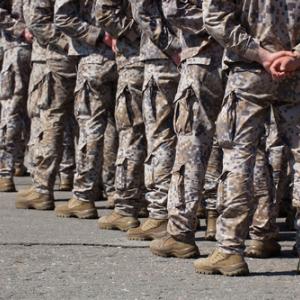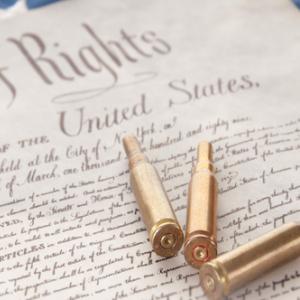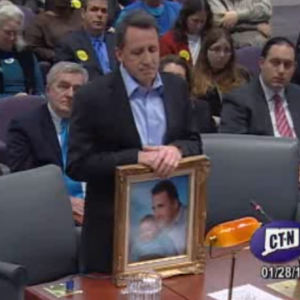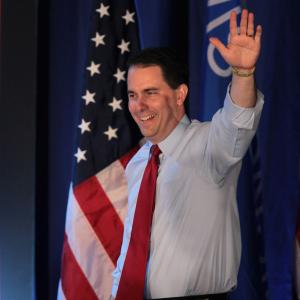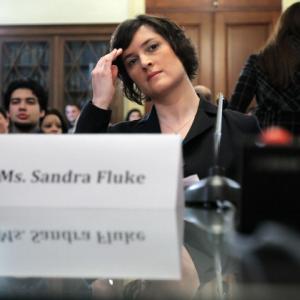Dr. Valerie Elverton Dixon is an independent scholar who publishes lectures and essays at JustPeaceTheory.com. She received her Ph.D. in religion and society from Temple University and taught Christian ethics at United Theological Seminary and Andover Newton Theological School.
Posts By This Author
'Except by Prayer and Fasting'
We learned the story in Sunday School.
Jesus and his inner circle — Peter, the rock, and James and John, the sons of thunder — came down from the Mount of Transfiguration and found the disciples facing their own inability to cast an unclean spirit out of a young boy. Annoyed with the disciples, Jesus says to the father: “If you believe, all things are possible to him who believes.” (Mark 9:23) The father replies: “Lord, I believe; help my unbelief.” (Mark 9:24) Jesus casts out the unclean spirit. Later, when the disciples ask why they were unable to do it, Jesus says that some only come out through prayer and fasting.
The Preciousness of the Person
"The Sacredness of Human Life: Why an Ancient Biblical Vision Is Key to the World's Future"
ETHICS ASKS the questions: What is right to do? How do we know? David P. Gushee puts the concept of the sacredness of human life at the center of his moral reasoning. A professor of Christian ethics at Mercer University in Atlanta, Gushee has given us a work that is an important milestone on the road of constructive Christian ethics.
In this book Gushee has set himself a large and ambitious goal. He writes, “I am proposing that, rightly understood, a moral norm called the sacredness of life should be central to the moral vision and practice of followers of Christ.”
He seeks to ground this moral norm in scriptural authority and in the Christian tradition at its best. His survey of scripture and of Christian history is truly impressive, considering most of the major elements of the Christian theological and ethical traditions, including the current thinking of liberation theology. He demonstrates knowledge of the feminist critique of scripture, and he at least mentions eco-feminism. The bibliography alone is worth the price of the book.
Moreover, Gushee also considers such important Enlightenment thinkers as John Locke and Immanuel Kant. He devotes a chapter each to German philosopher Friedrich Nietzsche and to the Nazi desecration of human life. There is much food for thought here.
For me, however, the book is primarily descriptive. And it does not provide an explanatory framework to help us understand why scripture and the Christian tradition have led the way in both the recognition of the sacredness of human life and in the violation of this holiness. It would have been helpful for Gushee to give us a brief discussion of Ernst Troeltsch, who in his two-volume The Social Teachings of the Christian Churches enables us to see that the line of demarcation between the church and the world is porous to the point that there is always interpenetration between the two. Church teachings leaven and flavor the moral thinking of the world outside its doors while the world’s often destructive ideologies come to church every Sunday and sit down on the front pew and sometimes preach from the pulpit.
A Just Peace President: How We Can End the War on Terror
In his remarks at the National Defense University two weeks ago, President Obama stopped just one sentence short of declaring an end to the so-called “war on terror.” This is and always was a misnomer. It is a category error. A “war on terror” cannot be fought with armies and weapons of warfare. Terror is a response. Terrorism is a tactic. A terrorist is a criminal who ought to be apprehended, tried, and if convicted punished through the criminal justice system.
It Is Time to Honor the Spirit of the Republic
Meaning happens when the purposes of the writer come together with what the reader thinks is important. Since all aspects of any one thing cannot be perceived all at once, we focus our attention on this or that aspect of a thing depending upon what we want to achieve. This is why we can read a particular text many times and find new insights each time. This is also why we cannot agree on what the Second Amendment of the U.S. Constitution means.
Respect for a Father’s Grief
We know we are addicted to something when that behavior damages our relationships with people. When alcohol, drugs, food, gambling, or work is more important than mother, father, husband, wife, child, friend, or neighbor, we know we have a problem. Similarly, we know that we are worshipping an idol when a created thing becomes more important than the Creator, when we put our faith in our fears and a dead thing that cannot love us back becomes the object of our ultimate concern. We know we are worshipping an idol when our devotion fails to cause us to love and to respect our neighbor.
In a Connecticut hearing about gun violence, Neil Heslin — a father whose son died in the mass shooting at the Sandy Hook Elementary School —asked why any one individual citizen needs military-style assault weapons and high-capacity magazines. People in the room answered by quoting the Second Amendment. In this case, the Second Amendment was more important than this father’s pain. Their lack of respect for his pain indicated a deficit of both compassion and love, not only for this grieving father but for a grieving nation.
Let us be clear. The Second Amendment is not holy writ, and a gun is not God. Far too many Americans have made these created things, these inanimate objects more important than the compassion we ought to have for one another. This is fetishism. This is idolatry. This is morally wrong.
Death in Broad Daylight: A Childhood Memory
When I was a little girl, my mother and I prayed together every night:
Now I lay me down to sleep.
I pray the Lord my soul to keep.
If I should die before I wake,
I pray the Lord my soul to take.
And then I would ask God to bless a list of people who were on my mind.
Every night I spoke about my own death, but death was not real. It never occurred to me that I would die or that my parents would die.
One day when I was in the fifth grade, we heard gun shots outside our school. Our teachers did not let us go outside for recess that day because a woman had been killed, caught in the crossfire of a domestic dispute between her son and his wife. By the time school was out, the body had been removed; there was no yellow crime scene tape. There was still blood on the ground to mark the spot of this tragic death. The next day it would be washed away.
Martin Luther King, Jr.: The Difference Between Power and Violence
Violence does not equal power.
Martin Luther King, Jr., understood this. Yesterday was King’s 84th birthday. This year the national holiday to honor him will coincide with President Barack Obama’s second inaugural ceremony. And, all of this happens in the wake of one of the worst mass shootings in the nation’s history. One month after the shootings at Sandy Hook Elementary School in Newtown, Conn. — which left 20 children and six adults dead, plus the killer’s mother, found dead in her home — the country grapples with the issue of gun violence. If the country is to come to consensus on the issue, we will have to distinguish between violence and power.
Vice President Joe Biden gave recommendations to the president regarding gun safety on King’s birthday. The questions the media are asking already abound: What recommendations can the president implement through executive order? Can an assault weapons ban pass Congress? Will victims and gun safety advocates be able to persuade Congress to pass meaningful legislation?
There will be varying interpretations of the Second Amendment, and there will be some who will argue that guns are necessary for self-defense. We will have the discussion as to whether or not the gun culture in the United States has taken on religious proportions.
Just Peace Theory and Foreign Policy
Just peace theory begins with the idea that peacemaking, peacekeeping, and peace building is a day-by-blessed-day proposition. Unlike just war theory, it does not begin when violent conflict is imminent. There are 10 just peacemaking practices that have a record of success. A just peace foreign policy employs these practices for the purposes of both national security and of international peace.
The 10 just peacemaking practices are: support nonviolent direct action; take independent initiatives to reduce threat; use cooperative conflict resolution; acknowledge responsibility for conflict and injustice, and seek repentance and forgiveness; advance democracy, human rights, and interdependence; foster just and sustainable economic development; work with emerging cooperative forces in the international system; strengthen the United Nations and international efforts for cooperation and human rights; reduce offensive weapons and weapons trade; encourage grassroots peacemaking groups and voluntary association. (Just Peacemaking: the new paradigm for the ethics of peace and war Glen H. Stassen editor)
Cooperation, interdependence, human rights, and democracy are important elements of just peacemaking practices. I say this is a power-with, not a power-over model of foreign policy. This is not a model of weakness, but one of strength. The strength comes from building relationships and partnerships with other nations on the basis of mutual respect.
Just the Facts Ma’am: Economic Analysis from the Congressional Research Service
When we listen to political debates about which public policies will strengthen the economy, it is easy to get lost in a statistical maze. Each side presents economic data in a way that supports their own theory of the case.
The Congressional Research Service (CRS) is a branch of the Library of Congress that can help us make our own assessments regarding public policy. According to the CRS website, its purpose is to provide “authoritative, confidential, objective and nonpartisan” analyses to members of Congress.
The relationship between tax rates and the economy is an issue in the current campaign. Thinking about this issue, the CRS looks at empirical data that may or may not confirm theoretical models or ideological assumptions. Thus, like the early TV detective Joe Friday, they want “just the facts ma’am,” and then they try to reach conclusion from these facts.
What Chief Justice Roberts Did Not Say
In 2009, during the debate over health care, I devoted a good deal of my time arguing in favor of President Obama’s efforts to provide some form of universal health care to the people of the United States. I argued that universal health care is a human right. I argued that providing a way for people to get medical care without the worry of going bankrupt or of having to be shackled to a job because they or someone in their family needs health care is a matter of establishing justice in our country. It is a matter of distributive justice.
In the Supreme Court decision upheld the Affordable Care Act (ACA a.k.a. Obamacare) Chief Justice John Glover Roberts, Jr., writing for the majority of the court, in effect said that the act is constitutional because Congress has the power of taxation. He quotes Benjamin Franklin: “Our Constitution is now established . . .but in this world nothing can be said to be certain, except death and taxes.”
Opponents of the ACA argued that the individual mandate that requires people to buy health insurance was unconstitutional. They argued that it was an overreach of governmental power to require someone to buy something. Supporters of the ACA argued that the individual mandate was constitutional under the powers granted to Congress under the commerce clause and because Congress has the power of taxation. The penalty imposed on people who do not buy health insurance will be collected by the IRS when a person files h/er income taxes. The penalty or tax only applies to people who can afford to buy health insurance but who choose to not buy it.
The chief justice’s opinion does not judge the morality of the law. Roberts does not speak of the Universal Declaration of Human Rights and the goals it sets for the entire human community, including universal health care. He does not speak of the concepts of liberty and justice for all, that the government has an obligation to its citizens to make health care something that is available to all.
For Nora Ephron
There are some movies that I can watch over and over and over again. One of these movies is Sleepless in Seattle, a Nora Ephron film. It is the quintessential chick flick. There is a mysterious quality about works of art that never grow old, that leave us feeling happier after we have wrapped ourselves in their wonder. They contain a human truth that touches something in us that is beyond explanation.
The movie about how two strangers find each other and true love is funny, engaging, quirky, and completely unrealistic. And perhaps therein lies its truth. It takes us to that place where we understand that there is more to life than that which we can see. There is more to life than what we can understand. It leaves us with the hope that there is such a thing as a love that will not be denied. It reminds us that love and faith walk hand in hand.
Aung Sun Suu Kyi and Rodney King
In 1991, Rodney King was stopped and beaten by a group of Los Angeles police officers. The stop was not unusual, and the beating was a tragic reminder of the history and the reality of police brutality in the United States. The difference this time was that the beating was recorded on videotape. Rodney King became a symbol of racist injustice perpetrated by ordinary people, of injustice perpetrated by law enforcement.
Also in 1991, the Norwegian Nobel Committee awarded the Nobel Peace Prize to Aung Sun Suu Kyi, a Burmese activist for democracy. Under house arrest at the time, she could not travel to Oslo to receive the award. She was then and is today a symbol of patient persistent witness against oppression and for human rights.
On June 16, 2012, Aung Sun Suu Kyi received her 1991 prize in Oslo. On June 17, 2012, Rodney King was found dead in the swimming pool of his home. Both of these individuals are important because of their choices for peace.
After Wisconsin: Hallelujah Anyhow
Scott Walker has survived. His intent to divide and conquer worked. First he sought to divide public workers – teachers and others from police and firefighters. This did not work. He sought to separate public employees from “taxpayers,” as if public employees are not also taxpayers. He brought South Carolina Gov. Nikki Haley to campaign for him. She boasted of being a union buster. So-called “right to work” is a pillar of conservative Republican politics.
The First Step: Let Us Pray
George Clooney and others were arrested on the steps of the Sudanese embassy last week to call attention to the violence in South Sudan. The actor-activist, along with Jon Prendergast, testified before the Senate Foreign Relations committee and conducted a series of media interviews to explain the situation in South Sudan, the world’s newest nation.
I applaud Clooney for using his star power to shine a light on the violence in South Sudan. Now that we see the problem the question for us is: what does this situation require of me personally?
Similarly, when we watch the Kony 2012 video that, for all of its flaws, informs people about the crimes against humanity of Joseph Kony and the efforts to bring him to justice, the same question arises.
The world is full to the brim with tragedy. We see the violence in Syria, people protesting their government are killed by their own government. We see world leaders who cannot come to consensus about the right thing to do.
What action will at once end the violence, protect the people, and depose an illegitimate government while not increasing violence in a complicated and volatile region of the world?
The Bible Lessons Rush Limbaugh Must Have Missed
Controversial radio talk-show host Rush Limbaugh has apologized for his awful comments against Sandra Fluke, a Georgetown law student who spoke to Congress in support of a health-care mandate requiring employers to provide insurance coverage for contraception. Fluke came to national attention when Rep. Darrell Issa (R-CA) chair of the House Oversight and Government Reform Committee refused to allow her to speak at a hearing on the issue.
The refusal led Democratic women on the committee to ask: “Where are the women?”
Later, Fluke testified at a non-official forum organized by Democratic Leader Nancy Pelosi. At this forum, Fluke spoke about the importance of hormonal contraception medication in treating other conditions that affect women’s reproductive health. Not all birth control pills are used for contraception. There was nothing about her testimony that comes anywhere close to the portrayal advanced by Limbaugh.
I have written about the clash of rights between religious liberty and equal protection under the law for women elsewhere, so I will not labor the point here.
No matter the reasons for Limbaugh’s objection to the mandate, clearly he has failed to learn one of the principle moral lessons that Jesus taught: “Judge not, so that you may not be judged.” (Matthew 7:1)
I have said and say again that whenever we make a judgment, we reveal more about ourselves than about the person against whom we are passing judgment.
In Memory of Whitney Houston
The Bible teaches us: “A good name is better than precious ointment and the day of death, than the day of birth.” (Ecclesiastes 7:1)
On this day, as the world morns the unexpected passing of legendary singer Whitney Houston, this wisdom reminds us that when we grieve death, we grieve our own loss.
Ms. Houston has passed from time into eternity, from this veil of tears to a place where there is no more pain and no more tears, where the only relevant judgment is the judgment of God Almighty.
As a girl, Ms. Houston sang in church, and in her last public performance she sang, “Yes, Jesus Loves Me.” In the time and space between, she lived a life of wealth and fame, of joy and pain.
Manners and Morals
When our parents teach us at a very young age to say the magic words — please and thank you — they give us our first lessons in morality. Manners are the first step to morality. Etiquette is the first gesture of ethics. Manner and morals derive from the mores of a society. Etiquette derives from the ethos and ethics of a society.
When Arizona Governor Jan Brewer wagged her finger in President Obama’s face upon his arrival in her state, she demonstrated not only a disregard for the Office of the President, but she simply displayed bad manners.
In the United States, we do not have a monarch that embodies the state in his or her person. In the United States, that person is the president of the United States. He and the vice president are the only two elected officials who are elected nationwide. Thus, the president is not only the head of the executive branch of government, but he is the representative of the entire country.
Governor Brewer’s demeanor toward the president was inappropriate. However, the deeper question is why would this woman think it is appropriate to put her finger in anyone’s face, president or not?
Mitt Romney, Luxembourg, and America the Beautiful
At a town hall meeting in New Hampshire, at least two members of the audience challenged Mitt Romney on the morality of America’s economic system and of the trickle-down theory of economics. Romney defended the concept that corporations are people and asked which country in the world has higher incomes than the United States.
Luxembourg.
And depending upon what measure one uses and which web site on consults, that list also includes the territory of Bermuda, the dependency of Jersey, Equatorial Guinea, United Arab Emirates, Norway and Switzerland.
It is true that the United States has the most powerful economy measured by Gross Domestic Product — nearly $15 trillion. China is number two with $10 trillion. But if we measure per capita income, the United States falls to number three behind Norway and Switzerland. (Norway: $43,400 Switzerland: $40, 680 U.S. $37,870)
According to the web site WiseGeek, Luxembourg has the highest income per capita in the world.
Righteous Indignation: Half of America is Poor

"Homeless and Cold" in New York City's Lincoln Square, 2010. Image via Wylio http://bit.ly/t8fOzE
There are times when a story in the news just makes one stop with a righteous indignation.The news I heard today that one in two Americans is now classified as poor makes me angry.
This means half of the people living the richest nation in the world are poor. Is this the American exceptionalism we want?
I am angry because this is a not necessary. I am angry that so many people are suffering, while our elected officials are playing games, unable or unwilling to do what is necessary to promote the general welfare of the nation.
Prayers for Burma
Last year in a blog post, I suggested that believers pray for the world’s bad actors, among them, the Burmese generals and Zimbabwe’s Robert Mugabe.
Someone must have prayed.
Secretary of State Hillary Clinton is in Burma, the first time in many years that a high-ranking American official has visited that country. President Obama has decided to send her to assess the situation after seeing signs of hope that the human rights situation is getting better.
In May 2009, Nobel Peace Prize Laureate Aung San Suu Kyi was under house arrest. Today, she has been released and the pro-democracy party that she represents has registered with the government. It plans to participate in upcoming elections.
Time Magazine reports that Burma’s new rulers are easing restrictions on media coverage. It has not, however released the large numbers of political prisoners it is holding, and it even fails to acknowledge that it is holding political prisoners.

